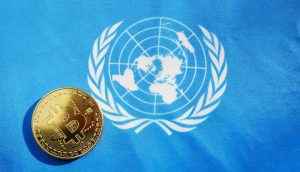The United Nations (UN) has been investing in guaranteeing fundamental humanitarian rights such as peace, security, human rights and sustainable development for decades. To date, the UN has relied on regulated, government-recognized fiat currencies such as the US dollar to pursue these goals. Now, UNHCR, the United Nations Refugee Agency, is using USDC stablecoin to help Ukraine refugees.
USDC donations to Ukraine
Using a new blockchain-based utility, UNHCR plans to distribute funds to “eligible recipients” in the form of stablecoin USDC. This “unique solution” aims to ensure that “cash assistance gets to the hands of those in need quickly, efficiently, securely and with full traceability and accountability,” according to the UNHCR. The Ethereum-native USDC tokens are to be transferred via the Stellar blockchain to the so-called “Vibrant Digital Wallet” of the recipients. The cryptocurrency received can then be exchanged for US dollars, euros or the local hryvnia currency at a total of 4,500 MoneyGram locations across the country. Karolina Billing, UNHCR’s Ukraine representative explains:
Around the world, UNHCR has worked with the technology sector for years, which has played a crucial role in innovating. In order to deliver aid more swiftly, speed is of the essence in humanitarian action.
Carolina Billing
The program is to be tested in cooperation with the Stellar Development Foundation in the Ukrainian cities of Kyiv, Lviv and Vinnytsia and expanded to other cities. Although the pilot phase of the project is specifically designed for Ukraine, it could be expanded to “other parts of the world”. The amount of the donation is unclear. In addition, it is not known how UNHCR classifies an “authorized recipient”.
UN with contradicting crypto strategy
However, the cooperation with a crypto company does not quite fit the ideal-typical image of the UN: In August of this year, the United Nations Trade Organization (UNCTAD) emphasized its doubts about Bitcoin and Co. in developing countries. The argument: The disadvantages of cryptocurrencies overshadow their advantages. In the policy briefs of the United Nations Conference on Trade and Development, the organization calls for curbing the increasing use of Bitcoin and Co. in developing countries.
read too
dr Penelope Hawkins, Senior Economic Affairs Officer in the Department of Debt and
Development Finance, Globalization and Development Strategies of UNCTAD was involved in drafting the crypto policy briefs. She told BTC-ECHO at the time: “In the area of financial inclusion, we’re not convinced that cryptocurrencies will do things better than, say, a fast bulk payment system.” The UNHCR branch organization obviously does not share this view.
Ukraine donations already at the beginning of the war
Indeed, crypto is an inherent part of Ukraine’s fundraising program. Already at the beginning of the Russian war of aggression, the government received financial support in the form of BTC, ETH and USDT. The state invested the aid money received in reconnaissance drones, armored vests and computer technology. Digital Minister Mykhailo Fedorov expressed his gratitude to the crypto community. The support would help “donation after donation to a big victory”, according to Fedorov.
read too

How helpful the UN donations will ultimately be remains to be seen. However, for an established aid organization to rely on the speed and transparency of blockchain transparency is an affirmation of the use case that cryptocurrencies bring.
Do you want to buy cryptocurrencies?
Trade over 240 cryptocurrencies like Bitcoin and Ethereum on Phemex, the platform for beginners as well as experienced investors.
The latest issues of BTC-ECHO Magazine
You might also be interested in this
